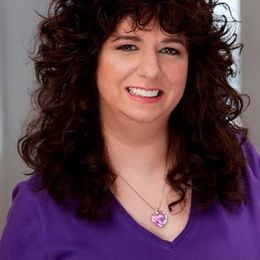SAG-AFTRA President Fran Drescher Shows Her Strength
From negotiating a major SAG contract to ageism in Hollywood, Fran Drescher stands up to it all

While many people know actress Fran Drescher from playing Fran Fine in "The Nanny," last year, they got to see another side of her: a force of nature who wasn't afraid to stand up against the proverbial "big boys" in the AMPTP — the Alliance of Motion Picture and Television Producers — when the time came to negotiate tough terms to the new SAG [Screen Actors Guild] contract.
Drescher, 66, recently took time to talk with Next Avenue via Zoom shortly before the SAG Awards about the negotiations, how she took charge and what's coming up in her career.
Next Avenue: For those who don't know, what was your role in the highly-publicized SAG contract negotiations, as well as the strike?
Fran Drescher: Our three-year contract was coming up for renegotiations, and this was a very big deal. Everyone knew that there was a lot that needed to be accomplished in preparation for this negotiation.
I put together an unusual group of people for my negotiating committee that fully represented every artist that is serviced by this contract. I feel like one of the problems when I came into the union and one of the things that divide other members is that people don't feel heard. I said, 'Time and patience is the secret sauce, and if everybody has it, and we really hear what people's grievances are, then we can debate with knowledge and come up with a conclusion of how to formulate the proposals for the contract.'
What historically was a two-day plenary (large group meeting) became an eight-day plenary, and people really got to understand each other.
Ultimately, most of the decisions that we made during plenary were unanimous. People that never got along were in agreement with each other — because I forced us to listen.
I never took sides. I gave everybody a chance to be heard. I never wanted to hear the histrionics. I said, 'It's your story and his story and somewhere in the middle is the truth. Let's just start fresh.'
What were the biggest issues you needed to address?
We were formulating an enormous proposal package. I saw the flaws in the system. The biggest issues had to do with digital, AI [artificial intelligence], and streaming. Members needed to be paid for work they do for streaming services. When you work in linear television [this means it's not on streaming, but regular TV], there's a lot of revenue that comes from residuals. The shows are designed to stay on as long as people are watching and ad dollars are coming in. The whole idea is to have shows stay on as long as possible. Then the shows go into syndication, and they sell again. Even after series end, if they're in syndication, SAG members continue to make money for years after. People on "The Nanny" are still making money 30 years after it aired.

That's not what happens on streaming. Shows do the heavy lifting of getting the platforms new subscribers. Once that happens, the services don't need the shows anymore. Hence the term "limited series" was born. These shows don't get sold to another place. The streaming services make them and air them. They will stay on the menu as long as they want them to, but that's it. You don't get any additional money. So we couldn't negotiate with streaming services the same way we had with linear television. We built a special contract for streaming.
Stories in the news kept mentioning that you were a strong woman. Why do you think that was such a surprise?
Because I'm The Nanny! Most people think of my character. The people who know me well are not the least bit surprised at all, but the people that don't know me, they were surprised. They didn't expect that I would have such clarity of mind, that I would have such acumen for the business aspect. I think a lot of people thought I was maybe president in name only. Maybe I was a figurehead. I run this company like a president of any company. I'm the president, and I can't do anything half-assed.
"I'm The Nanny! Most people think of my character. The people who know me well are not the least bit surprised at all, but the people that don't know me, they were surprised."
The day we went on strike, I said to my negotiating committee, 'I never want to come back to this office again' [the AMPTP offices]. From then on, we met at our offices.
I read that you took a stuffed animal into the negotiations with you.
I took a heart-shaped plushy toy that a little girl gave me who really adores me, and I said, 'I'm going to take this with me because it's going to remind me of you and give me a sense of confidence in the negotiating room.' I sat it in front of me, and it was with me every step of the way, including when we were in the negotiating committee room because there was a lot of arguing in there — a lot of aggressive male energy that I'm not used to.
What did you take away from this experience?
That there were a lot of different moving parts, and I, as a leader, saw the macro in the micro of it. It was much more than just negotiating a contract. They were trying to put me down as an ineffective leader and negotiator. I had to spin that because I saw this as low hanging fruit: Let's diminish the woman leader. We're going to get away with that.
"I can lead with empathy and intellect, and I can still work a red lip."
So, I posted a video where I was putting on makeup getting ready to go to the negotiating room, expressing how I can lead and not emulate male energy. I can lead with empathy and intellect, and I can still work a red lip. That was targeting women and girls, a big fandom of mine, and it went viral.
So, whatever was thrown at me I flipped it on them and that's the important thing. I don't change me. You change you. So, figure it out. At some point, and I was told this directly from one of the CEOs, they had to have a "come to Jesus" moment that this is not getting better. It's not going away, and we have to accept the fact that this is going to be one of those contracts where we need to put in big changes.
Not what they expected was going to happen at all. They weren't prepared, and they weren't prepared for me, they said.
Regarding ageism in Hollywood, do you think there's been more acceptance of older women and stories about older women? Do you see the needle moving at all?
I do, I do. Some of the women who are on streaming channels in lead roles are all in their 50s, and they're portraying powerful positions. I think that that's a very important step in the right direction. It's normalizing the reality of the situation.
Women don't really come into their own until they're in their 50s and 60s, typically because they're done sacrificing for the family, and they're ready to live their life their way. And so, a lot of dreams and ambitions only begin to get met in a woman's life when they're entering that period.
I think that "woman power" and a respect for elder women is becoming more and more in vogue across all platforms. In advertising, it's important that we see beautiful, confident, gray-haired ladies doing their thing, strutting their stuff. It's important that we support that as viewers. I think the industry at large is becoming more female-centric — more women directors, more women writers. This is the first year that all the unions had women presidents.
"Women don't really come into their own until they're in their 50s and 60s, typically because they're done sacrificing for the family, and they're ready to live their life their way."
What do you have coming up in terms of acting?
I'm supposed to do the sequel to "This Is Spinal Tap." So, I've been talking to Rob Reiner about what happened to my character, Bobbi Flekman.
I was supposed to shoot a movie over the summer with Adam Sandler and Ben Affleck, which was put on the back burner because of the strike. So, I'm imagining I will eventually get back to that, and I'm going to start putting pen to paper to write a book. I work as an influencer as a brand ambassador.
Right now, I don't exactly know where I'm going to plant my roots, but I think that this was a major undertaking. It catapulted me into another level of notoriety, and took my profile around the world. People thanked me for what I did for workers. So, I'm entertaining the idea of not only acting, but moving into other parts of entertainment that something like this might lend itself to.


